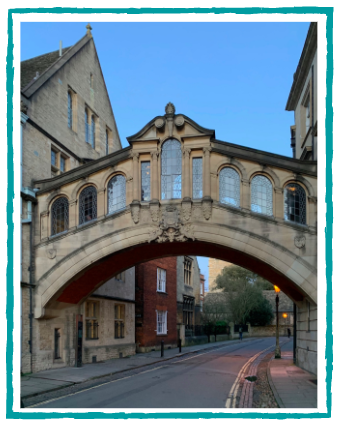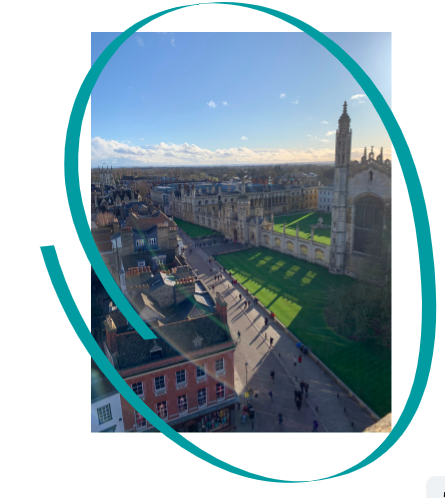Oxbridge Admissions – What you need to know when applying to Oxford or Cambridge
written by Jack Doyle, Dphil

From President Bill Clinton to influencer Caroline Calloway, Oxford and Cambridge are no strangers to applicants from the United States. These ancient and prestigious universities might be the right fit you didn’t think was possible – but how do you go about adding “Oxbridge” to your college choices?
The Brits have made everything from comedy shows to movies about the secretive world of the Oxbridge admissions process, which is more detailed and intense than most British universities. That might sound daunting – but here’s a breakdown of what you actually need to know when you’re applying to Oxford or Cambridge.
One application fits all.
British university applications go through one central system – UCAS. Your UCAS application includes one personal statement about your relationship to your chosen subject, one teacher reference, personal details, and up to five UK-based universities of your choice. If Oxford or Cambridge is one of your choices, you must submit your application – sometimes with supplementary information – by October 15th.
Choose a university, choose a college.

Oxford and Cambridge have been rivals for just over 800 years – no exaggeration! That means if you apply to Oxford, you can’t apply to “The Other Place” and vice versa. You’ll get a similar experience at both universities, but traditionally Cambridge is stronger in the sciences and Oxford rules the humanities roost. Some students prefer Oxford to Cambridge because Oxford’s a bigger city. Fortunately, they’re both pretty equidistant to London, the nightlife capital of the U.K.
The universities of Oxford and Cambridge are made up of colleges: dozens of mini-campuses with their own housing, culture, traditions, and reputations. Since most colleges offer a range of subjects, choosing a college from abroad can seem tricky, but luckily Oxbridge students have had centuries to work out the details. The Oxford and Cambridge student unions have developed “college suggester” tools and alternate prospectuses to help you find your home base.
Test your skills.
Depending on the subject you choose, Oxford and Cambridge will – unusually, for British universities – often ask you to sit a test or submit extra written work to get an idea of your abilities beyond your GPA. The tests are timed and hand-written, British style, and can be done at your high school with the supervision of a teacher or guidance counselor. These often involves some problem-solving or essay writing based on a question prompt. It’s a good idea to practice writing to a time limit if that’s not something you’ve done before.
Not your average college interview.
Every year after the October 15th application deadline and additional testing, Cambridge and Oxford invite roughly half of their applicants to interview. Many British and some international students usually spend a day or two in mid-December staying, being shown around, and interviewing at their college of choice. Fortunately, remote interview options via Skype and phone also exist.
On a very basic level, Oxbridge interviews are designed to see how you think. You’re in a room (or a Zoom call) with two tutors who ask you questions about your relationship to your chosen academic subject. Common themes include discussions of books you’ve read in your subject, things you’re curious about from school, or how you’d approach some of the ethical issues in your field. Math applicants might get presented with an equation to solve; literature students may be asked to read and analyze a poem on the spot.

Remember they’re not trying to trip you up – tricky questions are often a deliberate tactic to see how you deal with complex issues and new information rather than expecting you to know the answer. It’s okay not to know everything! Some good ways to prepare might be discussing a challenging book with a favorite teacher, watching academic debates that interest you on YouTube, and getting a feel for Oxbridge interviews on The Student Room, a popular British higher education forum.
An offer you can’t refuse.
Most British universities give you an “offer” rather than a straightforward acceptance letter – basically, letting you know you’re in if you get certain grades at the end of the year. This is usually more relevant to British students taking their end-of-year exams, or A-levels, but Oxford and Cambridge will be specific about which APs and/or standardized test results they require for your course.
As American-friendly universities, Cambridge and Oxford both have dedicated international offices – and even U.S. student loan teams – who can help you with the logistics of applying for a visa, sorting out your federal loan, and moving abroad. They’ll be available throughout the year to answer questions and make the process of moving abroad run smoothly.
Why Cambridge?
Oxford and Cambridge’s unique one-on-one “tutorial”-style teaching can’t be beat for personalized student experience. If you’re passionate and invested in a particular area of study, committed to doing some self-directed out-of-the-box thinking, and looking for a close-knit intellectual community, Oxbridge is an exciting international opportunity worth considering!
We are excited to welcome Jack Doyle to the RNG team! Want to learn more about applying to Cambridge or Oxford University, contact us here!













